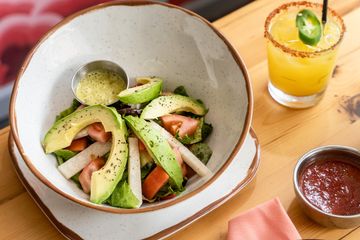Explore top picks on the lunch and dinner menu in town
Is Mexican Food Healthy And Balanced? Unloading the Nutritional Benefits of Standard Ingredients
The concern of whether Mexican food is healthy and balanced welcomes an exploration of its standard ingredients. Beans and corn act as fundamental staples, rich in healthy protein and fiber. Avocados provide helpful fats, while various herbs and flavors include taste and health benefits - tacos. With each other, these elements develop a tapestry of nourishment. Nonetheless, the healthiness of Mexican cuisine frequently depends upon prep work techniques and section dimensions. What duty do these factors play in determining its overall nutritional value?
The Power of Beans: Healthy Protein and Fiber-Rich Staples
Typically forgotten, beans serve as a keystone of Mexican cuisine, using a riches of nutritional benefits. Rich in healthy protein, they are an excellent plant-based choice for those looking for to satisfy their dietary protein requires. This high healthy protein material supports muscle fixing and development, making beans vital for both meat-eaters and vegetarians alike. Furthermore, beans are an extraordinary source of nutritional fiber, which helps in digestion and promotes a sensation of fullness, possibly aiding with weight administration.
The variety of beans made use of in Mexican meals, such as black beans, pinto beans, and kidney beans, adds to a varied flavor account and can improve meals nutritionally. Additionally, beans are low in fat and contain crucial minerals and vitamins, including magnesium, iron, and folate. With each other, these characteristics make beans a critical component, supplying both nutrition and nutrition in conventional Mexican price.

Corn: a Versatile Grain With Nutritional Perks
Corn attracts attention as a versatile grain fundamental to Mexican cuisine, commemorated not just for its culinary applications however additionally for its outstanding nutritional account. As a key ingredient in dishes like tortillas, tamales, and pozole, corn gives necessary nutrients that add to a balanced diet plan. Rich in carbs, it works as a substantial energy source, while also being low in fat, making it a desirable option for various dietary needs.
Moreover, corn is a good source of dietary fiber, which assists in food digestion and advertises satiation. It has substantial quantities of vitamins such as B-complex vitamins, which are crucial for power metabolic rate. The existence of antioxidants, particularly carotenoids, adds to total wellness by minimizing oxidative anxiety. Furthermore, corn is gluten-free, dealing with those with gluten sensitivities. On the whole, the dietary benefits of corn underscore its relevance in typical Mexican food and its function in a healthy diet.
Avocados: Healthy And Balanced Fats and Nutrients in Every Bite
Avocados play a considerable role in Mexican food, matching dishes with their luscious structure and rich taste. Beyond their culinary allure, avocados are celebrated for their impressive dietary profile. They are an abundant source of healthy and balanced monounsaturated fats, which can assist lower negative cholesterol levels and assistance heart health and wellness. Additionally, avocados are loaded with important vitamins and minerals, consisting of potassium, vitamin E, and B vitamins, contributing to total wellness.
The high fiber web content in avocados aids food digestion and promotes satiation, making them a helpful addition to any kind of meal. Their special nutrient composition can additionally support skin health and wellness and provide anti-inflammatory advantages. Incorporating avocados right into traditional Mexican dishes or enjoying them as a standalone snack can boost both flavor and nourishment, showing why they are a cherished staple in Mexican food. Overall, avocados use a delicious method to appreciate healthy fats and vital nutrients in every bite.

Natural Herbs and spices: Flavorful Health Boosters
While delighting in the rich flavors of Mexican cuisine, one can not ignore the crucial duty that spices and natural herbs play in boosting both preference and wellness. Ingredients such as cilantro, oregano, and chili peppers not only add to the vivid taste account yet additionally supply considerable health and wellness benefits. As an example, cilantro is understood for its cleansing residential properties, assisting to get rid of hefty steels from the body, while oregano is packed with antioxidants and has anti-inflammatory impacts.
Chili peppers, a staple in numerous Mexican dishes, include capsaicin, which has actually been connected to boosted metabolic process and discomfort relief. Furthermore, seasonings like cumin and coriander assistance digestion and might assist in blood glucose regulation. Including these flavorful health and wellness boosters into meals not only enhances the cooking experience however also advertises general health, making Mexican food not just delicious, yet additionally nutritionally advantageous.
Traditional Food Preparation Methods: Enhancing Nourishment and Taste
Traditional cooking techniques in Mexican cuisine play a crucial role in enhancing both nutrition and taste, as they commonly focus on classic techniques and fresh components. Techniques such as nixtamalization, where corn is soaked and cooked in an alkaline solution, not just boost the nutrient profile of tortillas however additionally enhance their digestibility - happy hour. In addition, using sluggish food preparation methods, like cooking or braising, permits flavors to meld perfectly while preserving the integrity of the active ingredients

Frequently Asked Inquiries
Are Mexican Food Portions Normally Larger Than Other Cuisines?
Mexican food sections are frequently bigger than those of lots of other foods. This particular mirrors typical dining practices, stressing communal sharing and hearty dishes, which can bring about a much more considerable serving dimension on the whole.
Exactly how Does the Preparation Approach Affect Healthfulness of Mexican Food?
Preparation hand crafted margarita techniques greatly influence the healthfulness of Mexican food. Methods such as cooking or steaming preserve nutrients, while frying can increase harmful fat content. Options of components and cooking designs inevitably determine total dietary worth.
Can Mexican Food Be Tailored for Certain Nutritional Constraints?
Mexican food can indeed be customized for details nutritional constraints. Substitutions, such as using corn tortillas for gluten-free diets or incorporating more veggies, allow individuals to appreciate typical tastes while fitting different nutritional demands.
What Are Common Misunderstandings Regarding Mexican Food and Health?
Common mistaken beliefs about Mexican food include the idea that it is naturally harmful, extremely hot, and only concentrated on fats. In truth, conventional meals frequently feature nourishing components and can be customized to various dietary demands.
Exist Healthier Choices at Mexican Restaurants?
Much healthier choices at Mexican restaurants usually consist of grilled meats, beans, and fresh veggies. Picking meals that stress whole active ingredients and staying clear of heavy sauces can bring about a much more nutritious dining experience, promoting total health.
The range of beans used in Mexican meals, such as black beans, pinto beans, and kidney beans, contributes to a diverse flavor account and can enhance meals nutritionally. Avocados play a considerable role in Mexican food, complementing recipes with their velvety structure and rich taste. Incorporating avocados right into conventional Mexican recipes or appreciating them as a standalone treat can enhance both taste and nutrition, demonstrating why they are a beloved staple in Mexican food. While appreciating the abundant tastes of Mexican cuisine, one can not forget the crucial duty that spices and herbs play in improving both taste and health. Traditional food preparation methods in Mexican food play a crucial duty in boosting both nutrition and flavor, as they usually focus on fresh components and time-honored strategies.